 Transatlantic Jurisdictional Conflicts in Data Protection Law
Transatlantic Jurisdictional Conflicts in Data Protection Law Published online by Cambridge University Press: 06 April 2023
Under public international law, a State has a right to exercise jurisdiction. States are expected to show restraint when attempting to regulate a situation with foreign elements. The research outlines territory- and personality-based permissive principles of jurisdiction. EU data protection provisions that lend themselves to extraterritorial application fall into the subjective territoriality, objective territoriality, passive personality, effects doctrine and potentially protective principles of jurisdiction. The provisions do not come under any one of these principles, but rather an interpretation of several of them. The applicable law articles in the General Data Protection Regulation could most plausibly constitute the objective territoriality (where an act is terminated) and passive personality (the nationality of a victim) principles. Whilst there appears to be a shift from territory to personality, for example, by referring to data processing in the context of activities ‘in the Union’ or individuals ‘subject to the jurisdiction of’ rather than data processing in the context of the activities ‘on the territory of a Member State’ or ‘in the territory of’ each state party’, to justify the exercise of jurisdiction, territory is still necessary to trigger the application of jurisdiction in the online sphere.
To save this book to your Kindle, first ensure no-reply@cambridge.org is added to your Approved Personal Document E-mail List under your Personal Document Settings on the Manage Your Content and Devices page of your Amazon account. Then enter the ‘name’ part of your Kindle email address below. Find out more about saving to your Kindle.
Note you can select to save to either the @free.kindle.com or @kindle.com variations. ‘@free.kindle.com’ emails are free but can only be saved to your device when it is connected to wi-fi. ‘@kindle.com’ emails can be delivered even when you are not connected to wi-fi, but note that service fees apply.
Find out more about the Kindle Personal Document Service.
To save content items to your account, please confirm that you agree to abide by our usage policies. If this is the first time you use this feature, you will be asked to authorise Cambridge Core to connect with your account. Find out more about saving content to Dropbox.
To save content items to your account, please confirm that you agree to abide by our usage policies. If this is the first time you use this feature, you will be asked to authorise Cambridge Core to connect with your account. Find out more about saving content to Google Drive.